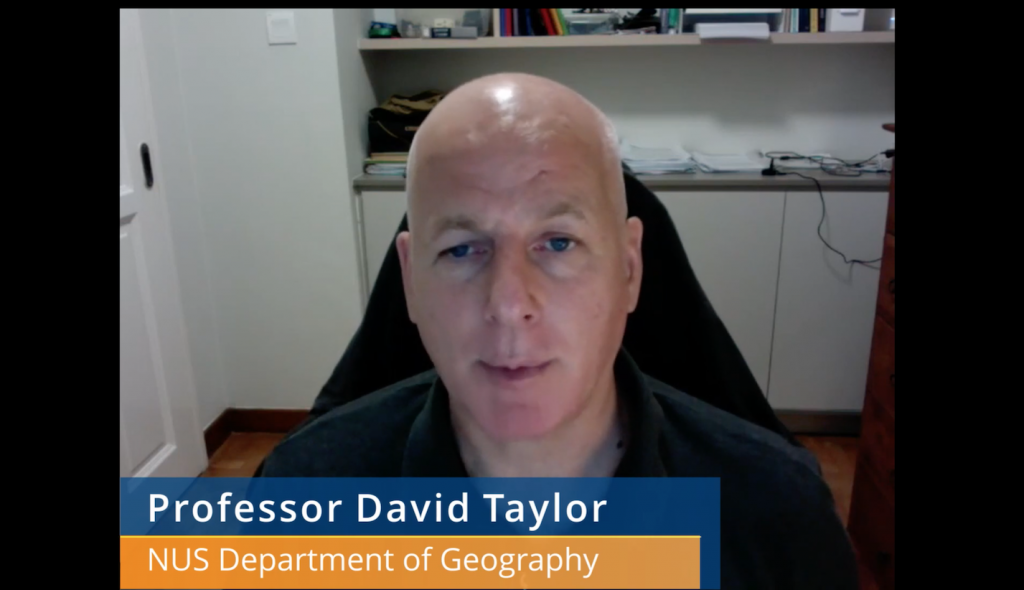Why Geography?
Located in one of the most culturally diverse and technologically advanced cities in the world, at the centre of an extremely dynamic and exciting region, the Department of Geography at the National University of Singapore (NUS) is a leading university in Asia.
Here, we nurture research excellence in three key areas: tropical environmental change, social and cultural geographies, and political and economic geography. Through our diversity of field modules in Southeast Asia and Africa, our students have the opportunity to develop their observational and research skills which help them understand the world better.


Message from our
Head of Department
Professor David Taylor is the Head of the Department of Geography. His research examines the human dimensions of environmental change, and he views environmental pollution as one of, if not the, grand challenge facing humanity. Previously, he held the Professorship (College Chair) in Geography at Trinity College, University of Dublin and was on the Council of the British Institute in Eastern Africa. He was also on the Board of the Governors of the Dublin, Ireland-based Mary Robinson Foundation for Climate Justice. Prof Taylor is currently working on the five year-long Transboundary Environmental Commons in Southeast Asia (TECSEA) project, and is a principal investigator of the multimillion-dollar NUS-funded Integrated Tropical Peatlands Research Programme (INTPREP).
Curriculum
Single Major [B.Soc.Sci (Hons)]
Pass at least 60 Units of GE courses or GE-recognised courses which include the following:
- GE1101E
- All five of the following:
- GE2101 Methods and Practices in Geography
- GE2102 Politics, Economies And Space
- GE2103 Our Planet: an Earth Systems Science Perspective
- GE2215 Introduction to GIS
- GE2231 Living Space: Introducing Social and Cultural Geography
- A minimum of 16 Units at level-3000
- A minimum of 20 Units at level-4000 or higher
- A maximum of one level-5000 GE course (subject to departmental approval)
Second Major
Pass at least 40 Units of GE courses or GE-recognised courses which include the following:
- GE1101E
- All five of the following:
- GE2101 Methods and Practices in Geography
- GE2102 Politics, Economies And Space
- GE2103 Our Planet: an Earth Systems Science Perspective
- GE2215 Introduction to GIS
- GE2231 Living Space: Introducing Social and Cultural Geography
- A minimum of 16 Units at level-3000 or higher
Minor in Aquatic Ecology
The Minor in Aquatic Ecology aims to expose students to the important disciplines of marine and freshwater ecological studies while developing relevant specific skills, knowledge, and experience among them. With the increasing governmental, private, and societal interest in aquatic sciences, there is a growing demand for manpower with expertise in freshwater and/or marine ecology.
This Minor complements aptly the primary disciplines of students from the Life Sciences Major and Geography Major. It will also enhance the training for students keen on related career opportunities at relevant governmental and private institutions in Singapore, including Public Utilities Board (PUB), National Environment Agency (NEA), National Parks Board (NParks), The Maritime and Port Authority of Singapore (MPA), Tropical Marine Science Institute (TMSI) and DHI Group.
This Minor is jointly hosted by the Faculty of Arts and Social Sciences (Department of Geography) and the Faculty of Science (Department of Biological Sciences).
Essential Courses – Pass the following 4 courses (total 16 Units)
- LSM2251 Ecology and Environment
- LSM3254 Ecology of Aquatic Environments
- GE3255 Aquatic, Riparian and Coastal Systems
- SP3203 Aquatic Ecology Research
Elective Course – Pass 1 of the following course (total 4 Units)
[For students reading Life Sciences Major, please select a non-LSM-prefixed module.]
- GE2103 Our Planet: an Earth Systems Science Perspective
- GE3256 Earth Surface Processes, Landforms and Ecosystems
- GE3253 Weather and Climate
- GE3221 Natural Hazards
- LSM4257 Aquatic Vertebrate Diversity
- LSM4260 Plankton Ecology
- LSM4261 Marine Biology
- LSM4264 Freshwater Biology
- LSM4266 Aquatic Invertebrate Diversity
Minor in Geosciences
Geosciences – the sciences of the Earth and its environment – are concerned with exploring ideas about the natural world, understanding the physical and chemical processes that determine the distribution of resources, location of hazards and operation of surface processes. Geosciences provide advice and guidance on preserving the environment, rehabilitating damaged ecosystems, determining the environmental impact of certain activities, mitigating environmental hazards and assessing the implications of environmental change. How the earth system will respond to human impact is one of the most pressing issues facing society
The subject area of Geosciences is not well represented in NUS beyond courses in the Department of Geography, nor is there provision in any other tertiary institutions in Singapore. Given the increasing significance of environment on national and international agendas it is timely to consider how to improve awareness of geosciences. A Minor in Geosciences would appeal to:
- Students who are interested in the functioning of environmental processes and concerned about the key issues of climate and environmental change, natural hazards and risk management and sustainable land use.
More specifically, it would appeal to:
- Science-based students who wish to complement their understanding of the physical sciences with an environmental focus;
- FASS students (particularly Geography majors) wishing to underpin their environmental knowledge firm a stronger foundation in science; and
- Engineering students wishing to complement environmental technology courses. Environmental Science and Engineering (ESE) is supporting the proposal.
Although there are several courses in NUS that deal with aspects of environmental technology, there are fewer specifically concerned with environmental processes. An opportunity to obtain a better grounding in the application of science to the understanding of the Earth and its environment would be beneficial to students at this time of increasing concern about environmental management. There are many international applied geosciences companies with regional offices in Singapore providing graduate employment opportunities. By developing a minor that enhances analytical and predictive skills in the geosciences area can contribute to improving Singapore’s competitiveness in this arena and to providing future leaders with enhanced environmental awareness that may influence policy development.
This Minor is jointly hosted by the Faculty of Arts and Social Sciences (Department of Geography) and the Faculty of Science.
1. Fundamental Earth Science – Read and pass both:
- GE2103 Our Planet: An Earth System Science Perspective
- XD3103 Planet Earth
2. Foundation Science – Read and pass 4 MCs from the following modules:
- CM1102 Chemistry - The Central Science
- CM1417/CM1417X Fundamentals of Chemistry
- LSM1103/LSM2252 Biodiversity
- LSM1301/LSM1301FC/LSM1301X General Biology
- PC1201 Fundaments of Physics
3. Elective modules – Read and pass any 8MCs from the following modules:
- GE3253 Weather and Climate
- GE3255 Aquatic, Riparian and Coastal Systems
- GE3231 Natural Hazards
- GE3256 Earth Surface Processes, Landforms and Ecosystems
- LSM2251 Ecology and Environment
- LSM3254 Ecology and Aquatic Environments
- LSM3255 Ecological of Terrestrial Environments
- EC3383 Environmental Economics
- GE2215 Introduction to GIS
- GE3250 Nature and Society
- GE3210 Natural Resources: Policy and Practice
- HY2235 Environmental History
- CE2134 Fluid Mechanics
- CE3132 Hydrology and Free Surface Flows
- CM3261 Environmental Chemistry
- ESE2001 Environmental Challenges in the Anthropocene
Minor in Geographical Informational Systems
The GIS Minor programme will produce graduates who are equipped to function as GIS specialists in industry, government and academia. It will:
- provide students with an interdisciplinary educational opportunity to enhance their individual disciplines through the study and application of GIS theory, methods and technologies;
- endow students with the geographical concepts and practical skills necessary to enter the job market as GIS specialists; and
- develop individuals with a broad grasp of GIS technology, and who are not only technologically competent but also solution-oriented.
The Minor is open to students from all Faculties and is designed to meet the needs of students from a variety of backgrounds. The Minor is appropriate for students interested in careers utilizing GIS as an analytical tool in such areas as geography, business, communication, engineering, environmental science, political science, public health, sociology, and urban planning, or for students pursuing GIS as a profession in a related discipline such as computer science or information systems. Students who complete the programme will leave it with a set of skills, and the ability to apply these to different areas of knowledge.
1. Essential courses – Read and pass both courses:
- GE2215 Introduction to GIS
- GE3238 GIS Design and Practices
2. Quantitative methods course – Read and pass 4 MCs from the following courses:
- ST1131 Introduction to Statistics and Statistical Computing
- ST2334 Probability and Statistics
- GE2101 Methods and Practices in Geography
- SC2101 Methods of Social Research
3. Elective courses – Read and pass any 8 Units from the following courses:
- AR2524 Spatial Computational Thinking
- CS1010/CS1010E/CS1010FC/ CS1010J/CS1010S/CS1010X/ CS1101S Programming Methodology
- CS2040/CS2040C Data Structures and Algorithms
- CS2030 Programming Methodology II
- CS2102 Database Systems
- CS3223 Database Systems Implementation
- IT2002 Database Technology and Management
- NM2213 Introduction to User Experiences Design
- GEI1002 Computers and the Humanities
- GE3216 Application of GIS and Remote Sensing
- GE3252 Cartography and Geovisualisation
- NM3213 Digital Humanities
Check out these interesting projects done by our students.
- 2015 Singapore Geospatial Challenge Projects
- Understanding the effect of Changes of Electoral Boundaries on the Election Results
- Mapping Potential Sea Level Rise in Singapore
by Reuben Li Mingguang, Chen Dewen and Luo Guo Ann (2008) - Analyzing Grain Size Distribution in Chek Jawa, Pulau Ubin, Singapore
by Feng Yikang, Lim Jingkai and Wong Young Jian (2008)
Minor in Urban Studies
It is estimated that the world’s urban population recently surpassed 50% of the total population. Asia remains less than 50% urbanised but is one of the most rapidly urbanising regions on Earth. International linkages between urban management professionals of various kinds are also increasing and Singapore is seen as a leader in many aspects of urban management, policy and planning. For these and other reasons, opportunities for urban professionals are likely to continue to increase.
Students will be offered the chance to develop expertise and skills in urban studies that would be an asset not only for those already majoring in an urban-related area, but also for the many others from various faculties who have an interest in urban-related careers. Students will get the opportunity to make explicit to employers their special strengths in this area.
Students will be provided with a good balance of breadth of knowledge, practical skills, and theoretical depth in a range of urban-related fields. The minor is not conceived as an introduction to any major in urban studies or such like. Instead, it is to be seen purely as a minor which can enhance the degrees and employability of students taking a wide variety of existing majors.
The Minor in Urban Studies is open to all students in NUS. It is jointly hosted by the Faculty of Arts and Social Sciences (Department of Geography) and the School of Design and Environment (Department of Real Estate).
1. Core courses – Read and pass 12 Units from the following courses, with at least 4 Units in GE:
- RE1705 Real Estate Finance and Accounting
- RE1701 Urban Land Use and Development
- RE1706 Design and Construction
- GE3204 Cities and Regions: Planning for Change
- GE3248 Cities in Transition
2. Elective courses – Read and pass 8 Units from the following courses:
- RE2706 Real Estate Finance
- RE2701 Urban Planning
- RE3701 Real Estate Investment Analysis
- RE3902 Housing Markets and Policies
- GE2102 Politics, Economies and Space
- GE3236 Transport and Communications
- ENV3104 Socio-Ecological Assessment of Environmental Impacts
- EC3381 Urban Economics
- EC3382 Transport Economics I
- SC3206 Urban Sociology
Job Ready
Our graduates are equipped with technical skills in GIS, and knowledge about sustainability, climate science, place and the environment. Many have gone on to become corporate leaders, politicians, university president, planners and researchers who have effected change in education, climate action, sustainability policy, and urban planning in Singapore.
Why CHS?
The College of Humanities and Sciences (CHS) is the enhanced undergraduate experience for students of the Faculty of Arts & Social Sciences (FASS) and the Faculty of Science (FOS) at the National University of Singapore.
Scale of Impact
Taps and builds on the research expertise of two of the largest and most established faculties in Singapore.
Deliberate Curriculum Curation
A distinct interdisciplinary approach that emphasises the ability to draw connections, discover links and connect insights across disciplines.
Unparalleled Flexibility
Offers greater choice and unparalleled flexibility to pursue breadth and depth from more than 1,000 courses per academic year.
Testimonials

Trini Goh
Geography
Why study Geography?
I chose to study Geography at NUS because it trains me to see the world as an interconnected system shaped by people, power, and place. Geography goes beyond maps and locations; it encourages me to ask why social and environmental inequalities exist, how urban spaces evolve, and how policies affect real communities on the ground. At NUS, the discipline’s strong emphasis on both human and physical geography has allowed me to connect theory with lived realities, especially in areas such as urban development, sustainability, and social justice. This has shaped the way I understand societal issues, not as isolated problems, but as outcomes of complex spatial and structural processes.
What has been your biggest takeaway from studying in FASS?
My time in FASS and CHS has developed in me strong analytical, research, and communication skills. The interdisciplinary curriculum has trained me to approach problems from multiple perspectives, while Geography modules have strengthened my ability to interpret data, conduct field-based research, and critically evaluate policies and narratives. More importantly, CHS has encouraged intellectual curiosity and adaptability. These are skills that will be essential as I navigate an evolving career landscape and engage meaningfully with complex social and environmental challenges.
Mohamed Ridzuan
Geography
Why study Geography?
Geography in university is vastly broader than what we are exposed to in secondary school and JC. In general, we are exposed to contents about environment, society, culture, politics and economics. You will be surprised to hear that we have courses on petroleum exploration, transportation and even gender issues. Apart from this, we are introduced to technical software through courses relating to Geographic Information Systems (GIS) which helps us in our research and data processing. Additionally, NUS Geography gives each student flexibility and allows them to focus more on their interests, not just in class but also out in the field with various field opportunities.
What do you intend to do after graduation?
I intend to join the education sector as a teacher. I hope to inculcate the lessons I have learnt from NUS Geography and FASS in my students and change their perceptions of the arts and social sciences.


Lorraine Lai
Regional and Marketing Manager at Grab
Geography '08
"After graduating from the Department of Geography, I started my career at the Singapore Tourism Board where it was exciting to be part of developing the first integrated resorts in Singapore.
Subsequently, I landed myself marketing roles at Standard Chartered, Google and now Grab. My work has taken on a regional function, which means I lead the brand direction of a product, whilst working closely with in-country marketing teams to execute localised marketing initiatives.
I love the regional nature of my marketing role because I get to work with colleagues from different geographies and cultures. While I guide local marketing teams on the brand vision of an overall product and ensure they are aligned across markets, I appreciate the efficacy of localised marketing initiatives, all thanks to an education rooted in Geography and the social sciences.
Being part of the Geography Honours class of 2008 remains one of my fondest memories of being part of FASS! Exam periods were the most memorable part of my NUS experience: from studying through the night, to late night prata suppers and “choping” (reserving) seats in the Central Library for study sessions.
My FASS education helped me to think analytically, to structure and crystallise thoughts and ideas, and present them in writing or in speech effectively. That is largely what a marketer’s job is about—presenting ideas persuasively. But for a marketer to do this successfully, one must know the targeted audience. Studying the social sciences and humanities enables one to consider the joys, gaps and problems that humanity experiences. Only when equipped with this knowledge can we then find solutions to address real human needs.
Finding your dream job may not be straightforward but I encourage you to stay curious, learn beyond your comfort zone, and stretch all possibilities!"
Ang Hin Kee
Ang Hin Kee, is the Assistant Director-General of National Trades Union Congress (NTUC) and chief executive of the Singapore National Co-operative Federation (SNCF)
Geography '91
"Tin Tin, the intrepid traveller, epitomises the spirit of Geography. He travelled the world, explored new lands, and made new discoveries. Like him, geographers travel, observe, and in doing so, we unravel the mysteries of the physical and human world."
During my undergraduate education in the NUS Department of Geography, I undertook writing an honours thesis (an extended research essay). I still retain notes of the comments given by my thesis supervisor on the various submissions I had made then. On hindsight, the training in Geography has honed my skills to be a focused thinker, a succinct writer and a sharp communicator. Apart from those skills, I gained other rewards from my time at NUS: a degree, friendships, and fond memories of my time there.
I give back to the Singapore community now by serving as a union leader, representing a range of employees and their workplace interests. Sometimes, there may be inherent weaknesses in the relationship between management and workers, and external triggers can result in a breakdown in workplace relations. I found that the best way to approach those inherent weaknesses and other workplace concerns is to carry out the necessary groundwork by studying the situation, interviewing people, observing the dynamics, then draw linkages and identify solutions. These skills are all part of the adventurous spirit and fieldwork training of a geographer.
May the NUS Geography Department continue to train more adventure seekers!

Tan Seng Chai
Chief Corporate and People Officer, CapitaLand Group
"It's a new normal we live in, and there are critical attributes the next-generation workforce must possess in order to thrive, including the willingness to learn, ability to innovate, and high adaptability. CapitaLand recognises this and proactively collaborates on opportunities that encourage the development of these traits. That is why we're supportive of the curriculum at NUS College of Humanities and Sciences. Its focus on interdisciplinary education coupled with experiential and problem-based learning will allow future-ready CHS graduates to handle a variety of workplace scenarios across different disciplines better, and put them in good stead to ride the waves of the future of work."

The Faculty of Arts and Social Sciences, National University of Singapore (NUS) is committed to environmental sustainability.
This e-brochure is part of our sustained effort to reduce waste and foster a culture of care for the environment among the NUS and broader community.


